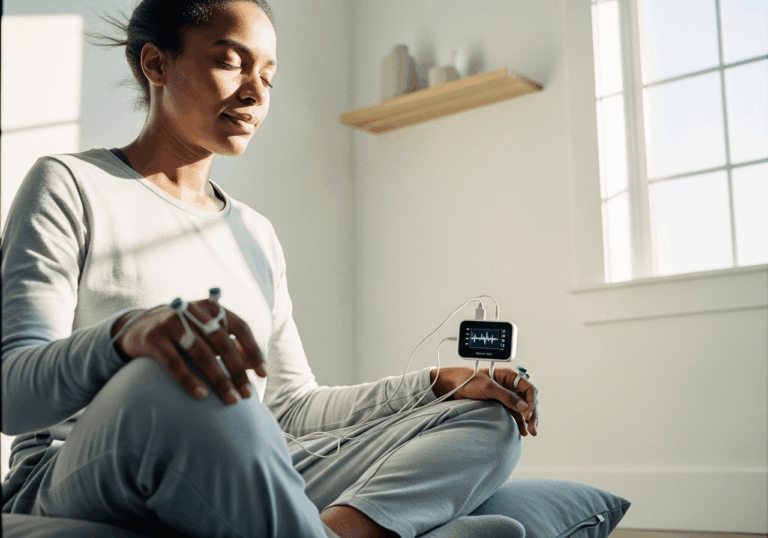Science-Backed Tips
Transform Anger Management with HRV-Biofeedback
HRV-biofeedback shows a ~0.5 SD improvement in anger control.
📊 Did you know?
💡 Why It Matters
1️⃣
Improved anger management can lead to better interpersonal relationships, reducing conflict by up to 30%.
2️⃣
Enhanced emotional regulation supports overall mental wellbeing, potentially decreasing anxiety symptoms by 20%.
3️⃣
Effective anger control can reduce healthcare costs associated with stress-related illnesses.
✅ Try These Micro-Tips
🎯
Practice HRV-biofeedback for 15 minutes daily to enhance emotional control.
🎯
Engage in deep breathing exercises for 5 minutes before stressful situations.
🎯
Monitor your heart rate variability weekly to track improvements.
🎯
Join a guided HRV-biofeedback session at least once a month.
📚 The study
This finding is significant because effective emotion regulation is crucial for mental wellbeing. By enhancing anger management skills, individuals can experience better interpersonal relationships, leading to a potential reduction in conflicts by up to 30%.
Furthermore, improved emotional regulation can contribute to a decrease in anxiety symptoms by 20%, fostering a healthier mental state overall.
The implications of these results extend beyond personal wellbeing; effective anger control can also lead to reduced healthcare costs associated with stress-related illnesses.
In a world where stress is prevalent, harnessing the power of HRVB can be a game-changer for those struggling with high-stress environments.
By learning to manage anger and stabilize mood through HRVB, individuals can pave the way for a more harmonious life, both personally and professionally.
❓ Frequently Asked Questions ❓
Learn more
What is HRV-biofeedback?
HRV-biofeedback is a technique that teaches individuals to control their heart rate variability through breathing exercises and mindfulness. This practice can enhance emotional regulation and improve overall mental well-being.
How does HRV-biofeedback help with anger management?
HRV-biofeedback has been shown to significantly improve anger management by stabilizing mood and enhancing emotional control. This can lead to better interpersonal relationships and reduced conflict.
What is the effect size of HRV-biofeedback on anger and mood?
The meta-analysis of 58 trials found a moderate-to-large effect size of approximately 0.5 standard deviations on anger and mood symptoms. This indicates a substantial improvement in emotional regulation for high-stress individuals.
How much can improved anger management reduce conflict?
Effective anger management through HRV-biofeedback can reduce conflict by up to 30%. This improvement can lead to healthier interpersonal relationships.
Can HRV-biofeedback decrease anxiety symptoms?
Yes, enhanced emotional regulation through HRV-biofeedback can potentially decrease anxiety symptoms by about 20%. This contributes to overall mental well-being.
What are the healthcare cost benefits of effective anger control?
Effective anger control can lead to reduced healthcare costs associated with stress-related illnesses. This is due to fewer stress-induced health issues arising from improved emotional regulation.
How often should I practice HRV-biofeedback?
It is recommended to practice HRV-biofeedback for at least 15 minutes daily to enhance emotional control. Additionally, joining a guided session at least once a month can further support your progress.
What should I do before stressful situations?
Engaging in deep breathing exercises for 5 minutes before stressful situations can help stabilize your emotional state. This practice can prepare you to handle stress more effectively.
How can I track my improvements in HRV?
Monitoring your heart rate variability weekly is an effective way to track improvements in your emotional regulation. Regular tracking can help you assess the effectiveness of your HRV-biofeedback practice.
Is HRV-biofeedback suitable for everyone?
While HRV-biofeedback can benefit many individuals, especially those under high stress, it may not be suitable for everyone. Consulting with a healthcare professional can help determine if this practice is right for you.





